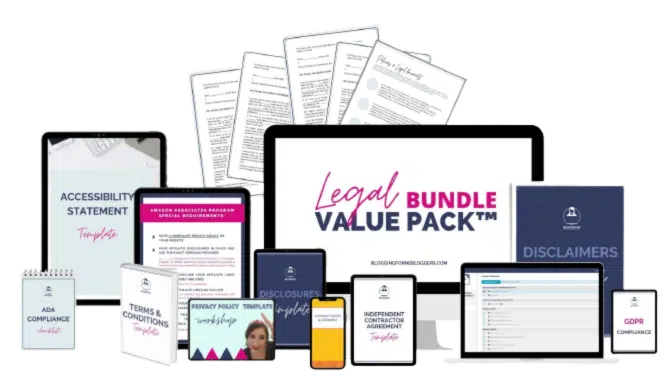Note: Affiliate links may be used in this post. When you buy through my affiliate links I may earn a commission at no extra cost to you. Full disclosure here.
Blog Legal Pages You Need to Have
Are you wondering what blog legal pages you need to make your website legit?
Many new bloggers don’t realize that there are certain legal pages you need to have on your website. This is especially critical if you plan to treat their blog like a business and make money from it, rather than it being just a hobby.
Luckily, this is not as intimidating as it sounds!
I am not a lawyer and I am not offering legal advice. That’s why I recommend taking this FREE course that was created by a lawyer, blogger, and legal expert.
Legally Blogs is a free course that will walk you through everything you need to know about making sure that your blog is running legally.
This is the first place you should start if you want to understand what legal pages your blog needs and how to make sure your blog is legal.
You can also purchase done-for-you legal page templates to use on your blog. Check out the Legal Bundle Value Pack for more information!
Now let’s get into the essential blog legal pages you need to have:
Privacy Policy
A privacy policy is one of the most important legal pages that you need to have on your blog. This page informs your website visitors about any kind of personal data you collect from them, and exactly how that data is used.
Now, you might be thinking, I’m not even collecting data from anyone!
But even without realizing it, you probably are. If you collect email signups on your blog, have a contact form on your blog, allow comments on your blog, use Google Analytics on your blog, etc., you’re collecting data.
This can be information like email addresses, IP addresses, location data, cookies, and more. You need a privacy policy to address all of this.
There are many privacy laws around the world now known by an alphabet soup of names including GDPR, CCPA, COPPA, PIPEDA, and more.
You will want to have a privacy policy that complies with all these regulations and clearly states how all data is collected and used on your site.
Terms & Conditions
Another blog legal page you need to have is a terms & conditions page.
You’ve probably accepted hundreds of terms & conditions for websites and apps you’ve used before, without actually reading through them.
Terms & conditions, also known as terms of use, are basically just the legal terms that you are setting for your website visitors when they visit your blog.
This includes stating your intellectual property rights, your right to make changes to your site, the obligations visitors have when interacting with your site, your ability to terminate anyone’s right to visit your website, and so on.
You should also use this page to disclose a limitation of liability for your blog, which prevents you from being held liable in certain legal scenarios.
Disclaimer
Next up is a disclaimer. This is essentially just a notice that states that you and your website are not responsible for certain outcomes.
For example, let’s say you have a blog about health and fitness, and you share the details of a diet that worked for you. You need a disclaimer on your blog to state that you are not responsible for the outcome of someone else following the diet (or anything else you write about), and that you cannot guarantee results.
Similarly, if you are a personal finance blogger and you recommend investing in crypto, you would want a disclaimer stating that you cannot be held liable for anyone losing their money from investing in crypto after reading your advice.
Is it likely that someone is going to file a lawsuit over something like this? No, probably not. But it’s better safe than sorry when it comes to disclaimers.
They are especially important to have if you blog about topics related to fitness, medical, health (including mental health), personal finance, and legal matters.
Disclosure
Finally, your blog should have an affiliate disclosure if you plan to make money from affiliate marketing. This is something super important! Without a disclosure, you’re even at risk of being kicked out of an affiliate program.
If you want to use affiliate links on your blog and earn a commission from readers who click your link and make a purchase, you must disclose it.
An affiliate disclosure complies with guidelines set by the FTC about disclosing such partnerships with your audience and provides transparency.
Additionally, you must have a link to your full affiliate disclosure at the top of every page on your blog to comply with FTC guidelines.
Some affiliate programs (such as the Amazon affiliate program) even require specific language to be used in your affiliate disclosure.
How to Create Blog Legal Pages
You don’t have to be a lawyer to create your own blog legal pages!
There are plenty of free online legal page generators out there that you can use as a budget-friendly DIY option for creating these pages.
However, I don’t recommend this.
The legality of your website is not an area where you want to cut corners.
But what if you don’t have thousands to pay to consult a lawyer?
Here’s a happy compromise: pay for lawyer-drafted legal page templates that you can use on your blog. This will give you peace of mind that your website is legit without having to spend a fortune on lawyer fees.
The Legal Bundle Value Pack was created by Lucrezia Iapichino, a blogger who is also a lawyer and legal expert. She designed this bundle for other bloggers, and it contains all the legal pages you need for your blog!
Plus, you get access to tons of helpful bonuses.
This is the BEST value option for creating legal pages for your blog without risking a free generator or paying thousands to consult a lawyer.
Legal Bundle Value Pack
Here’s what you get inside the Legal Bundle Value Pack:
- Privacy Policy Template ($167 value)
- Terms & Conditions Template ($267 value)
- Disclaimers Template ($117 value)
- Disclosures Templates ($97 value)
- Copyright Notice Template ($97 value)
You get lifetime access to these templates and all future updates, as well as a license to use them on multiple websites if you have more than one blog.
You’ll also get access to more than a dozen great bonuses:
- Cookie Policy Template ($67 value)
- Privacy Policy Workshop ($127 value)
- Refund & Return Policy ($147 value)
- Terms & Conditions for Printables Template ($157 value)
- Amazon Associates Special Requirements Module ($32 value)
- Governing Law Clause ($97 value)
- Mandatory Arbitration Clause & Class Action Waiver ($157 value)
- Sponsored/No Follow Links Module ($27 value)
- Cease and Desist Letter Template ($197 value)
- DMCA Takedown Notice Template ($197 value)
- Copyright 101 Module ($67 value)
- GDPR Requirements Module ($97 value)
What’s the price of all of this? You can get it all for only $197.
This one-time payment gives you access to all five legal templates, as well as all the bonuses mentioned above (and several more bonuses!)
Click here to get the Legal Bundle Value Pack.
More Blogging Tips
Now that you know the essential blog legal pages you need to have, check out the following posts for more tips and advice on starting a blog:


